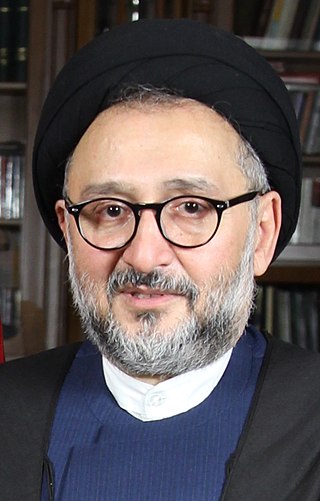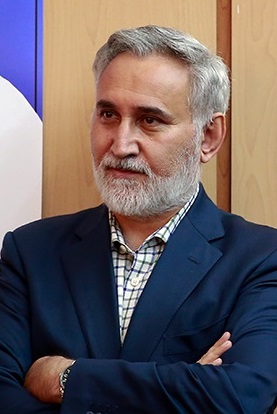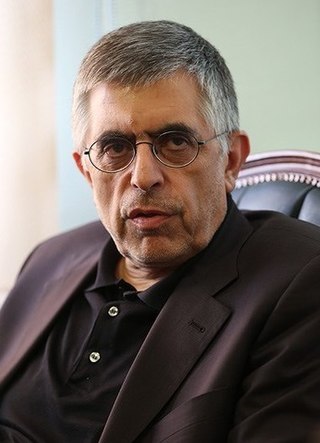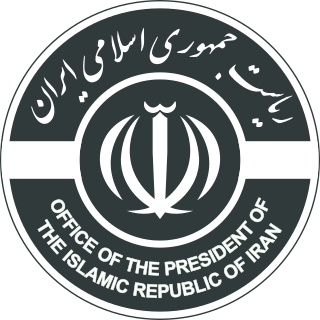| |||||
| Decades: | |||||
|---|---|---|---|---|---|
| See also: | Other events of 2001 Years in Iran | ||||
Events from the year 2001 in Iran.
| |||||
| Decades: | |||||
|---|---|---|---|---|---|
| See also: | Other events of 2001 Years in Iran | ||||
Events from the year 2001 in Iran.

Mohammad Khatami is an Iranian reformist politician who served as the fifth president of Iran from 3 August 1997 to 3 August 2005. He also served as Iran's Minister of Culture from 1982 to 1992. Later, he was critical of the government of subsequent President Mahmoud Ahmadinejad.

Seyed Mohammad-Ali Abtahi is an Iranian theologian, scholar, pro-democracy activist and chairman of the Institute for Interreligious Dialogue. During the 1980s, he worked as the head of IRIB broadcasting in Mashhad, Bushehr, and Shiraz, and between 2001 and 2004 he worked as the vice-president for legal affairs in Majlis and was the advisor to the president between 2004 and 2005.

The Islamic Iran Participation Front was a reformist political party in Iran. It was sometimes described as the most dominant member within the 2nd of Khordad Front.

Mohammad-Reza Khatami is an Iranian reformist politician and nephrologist.

Sayyid Mostafa Tajzadeh is an Iranian reformist politician and a senior member of Islamic Iran Participation Front, as well as Mojahedin of the Islamic Revolution of Iran Organization.

The Reformists are a political faction in Iran. Iran's "reform era" is sometimes said to have lasted from 1997 to 2005—the length of President Mohammad Khatami's two terms in office. The Council for Coordinating the Reforms Front is the main umbrella organization and coalition within the movement; however, there are reformist groups not aligned with the council, such as the Reformists Front. Masoud Pezeshkian, a reformist, was elected president following the 2024 Iranian presidential election, and was subsequently approved by the Supreme Leader on the 28th of July, having been inaugurated two days afterwards in Tehran.

Mohammad Reza Aref is an Iranian engineer, academic and reformist politician who is the eighth and current first vice president of Iran since 2024, under President Masoud Pezeshkian. He is also currently member of the Expediency Discernment Council since 2002.

Presidential elections were held in Iran on 8 June 2001. The result was a victory for incumbent president Mohammad Khatami, who was re-elected for a second term.

The Office for Strengthening Unity, is an Iranian student organization created in 1979, and has been described as "the country's most well-known student organization," and "Iran's leading prodemocracy student group". Founded in 1979 as a conservative Islamist organization to combat leftist, more secular, student groups, the OSU has evolved to support democracy and reform in Iran and thus is now in opposition to the political heirs of its founders.

Gholamhossein Karbaschi is an Iranian politician and former Shia cleric who was the Mayor of Tehran from 1990 until 1998. He is considered politically reformist and is a close ally of former president Mohammad Khatami. He was arrested, tried, convicted and imprisoned on corruption charges in what the New York Times claimed "was widely seen among moderates as a politically motivated attack" by the government's conservatives and hard-liners to thwart President Mohammad Khatami's reformist agenda. He was the General Secretary of Executives of Construction Party until 2021.

On May 8, 2006, Iranian President Mahmoud Ahmadinejad sent a missive directly to then United States President George W. Bush that proposed "new ways" to end the dispute over the Islamic Republic's development of nuclear power.
Events in the year 2003 in the Islamic Republic of Iran.

Abdolvahed Mousavi Lari Persian: عبدالواحد موسوی لاری is an Iranian Shia cleric and reformist politician. He was the interior minister during the presidency of Mohammad Khatami.
Iranian president Mohammad Khatami's two terms as president were criticized by conservatives, reformers, and opposition groups for various policies and viewpoints.

Mohammad Saeedikia is an Iranian politician who was the former head of Mostazafan Foundation, from 2014 to 2019. He served as a government minister in different cabinets last of which was minister of housing and urban development from 2005 to 2009.

Mohammad Shariatmadari is an Iranian politician and former Minister of Cooperatives, Labour and Social Welfare. He was in position of minister of Industry, from 2017 to 2018. He also served as minister of commerce from 1997 to 2005 in the cabinet of President Mohammad Khatami. He was campaign chairman of Hassan Rouhani for 2017 bid.
Events from the year 1999 in Iran.
Events from the year 1998 in Iran.
Events from the year 1997 in Iran.

The Presidential Administration of Iran consists of the immediate staff of the current President of Iran and multiple levels of support staff reporting to the President. It is located in Pasteur Street.